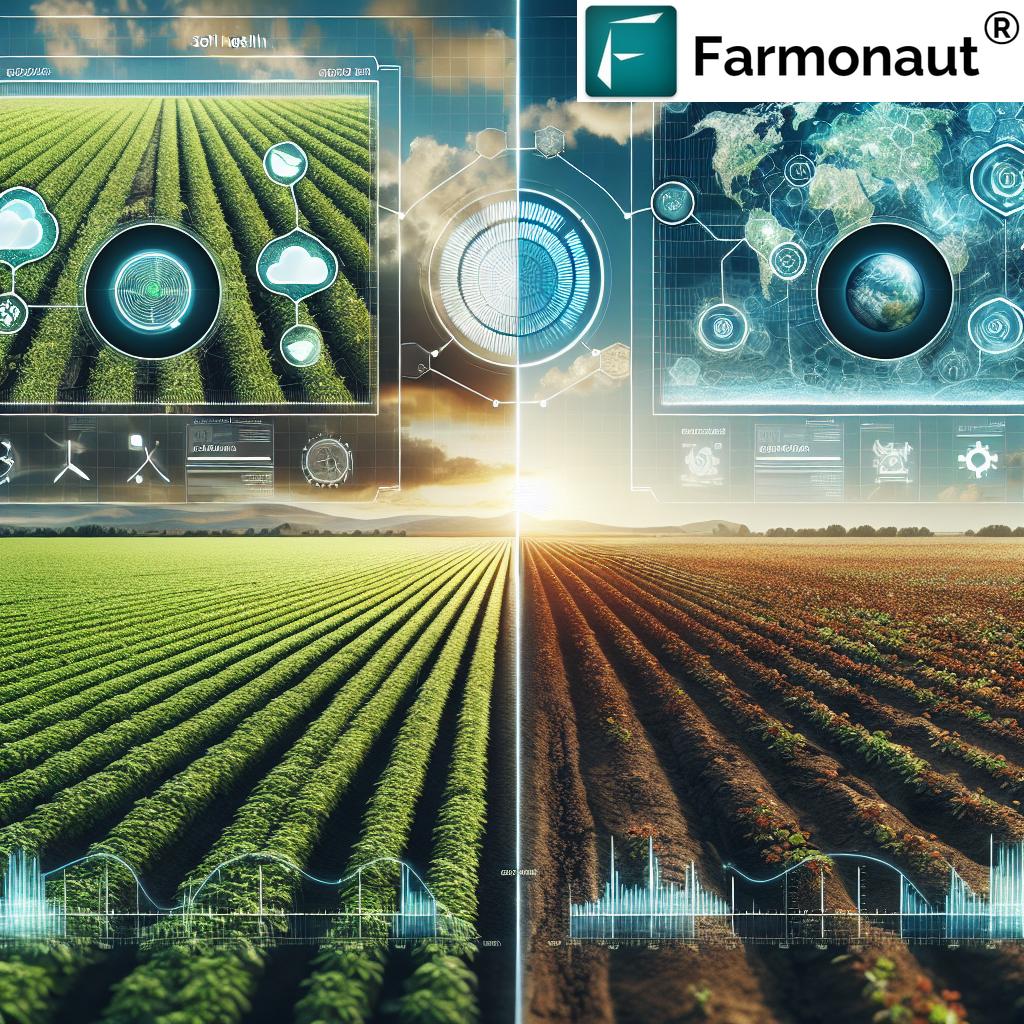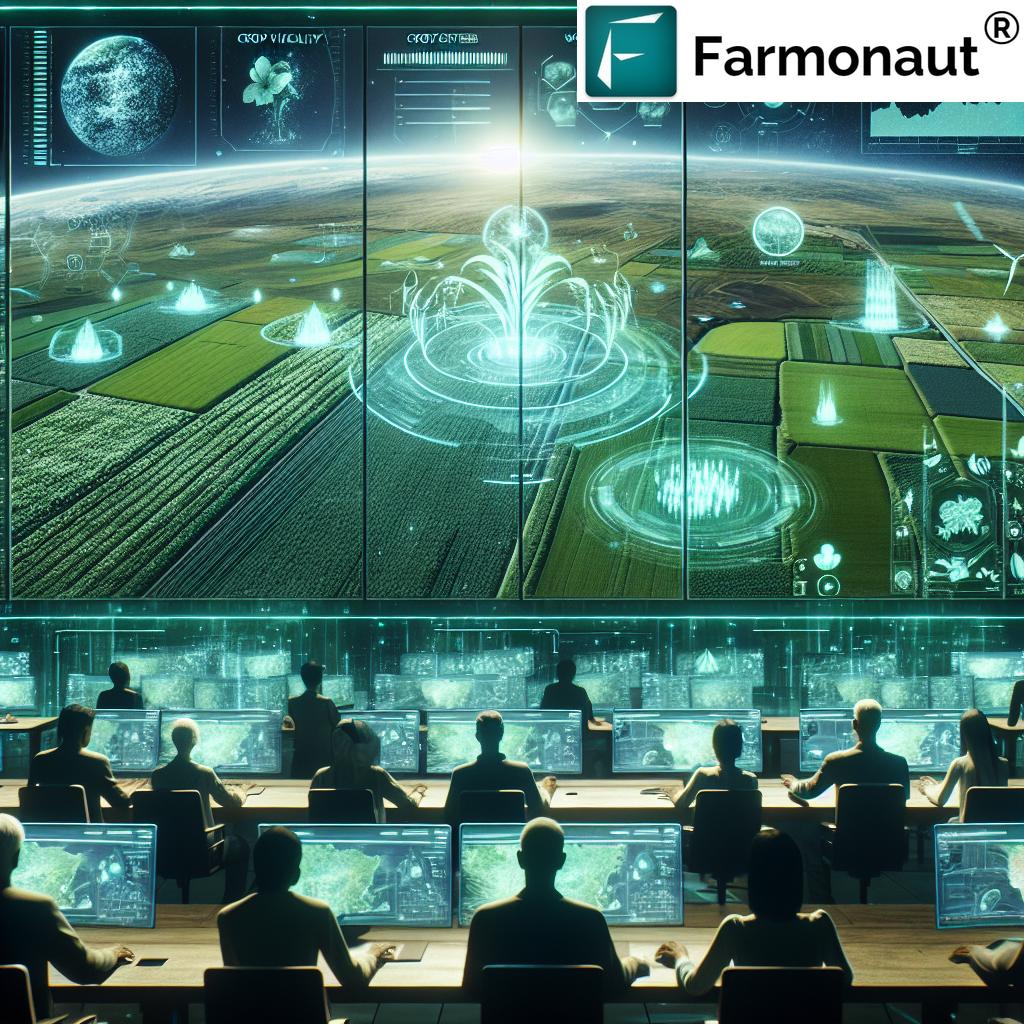Humanitarian Legacy: How Sustainable Agriculture and Precision Farming Technology Improve Global Food Security

“Farmonaut’s precision farming technology has improved crop yields by up to 30% while reducing water usage by 20%.”
In today’s world, where global food security is an ever-pressing concern, sustainable agriculture and precision farming technology are emerging as powerful tools to address this humanitarian challenge. As we delve into this crucial topic, we’ll explore how innovative approaches, such as those pioneered by Farmonaut, are revolutionizing the agricultural landscape and contributing to a more food-secure future.
The Intersection of Technology and Agriculture
The agricultural sector is undergoing a profound transformation, driven by the integration of cutting-edge technologies. From crop monitoring systems to soil health management, these advancements are reshaping how we approach farming in the 21st century. At the forefront of this revolution is precision farming technology, which leverages data-driven insights to optimize agricultural practices.
One of the key players in this field is Farmonaut, a company that has made significant strides in making precision agriculture accessible and affordable. Through their innovative platform, farmers can access vital information about their crops and make informed decisions that lead to improved yields and resource efficiency.
The Power of Agricultural Remote Sensing
Agricultural remote sensing is a game-changing technology that allows farmers to monitor their crops from afar. By utilizing satellite imagery and advanced sensors, farmers can gain valuable insights into crop health, soil moisture levels, and potential pest infestations. This technology is particularly crucial in addressing challenges related to climate change and resource scarcity.
Farmonaut’s platform exemplifies the potential of remote sensing in agriculture. Their satellite-based crop health monitoring system provides real-time data on vegetation health, empowering farmers to make timely interventions and optimize their crop management strategies.
Harnessing the Power of Farm Data Analytics
Farm data analytics is another cornerstone of modern agriculture. By collecting and analyzing vast amounts of data, farmers can gain unprecedented insights into their operations. This data-driven approach allows for more precise decision-making, leading to increased productivity and sustainability.
Farmonaut’s Jeevn AI Advisory System is a prime example of how farm data analytics can be leveraged to provide personalized recommendations to farmers. By analyzing satellite data and other inputs, this AI-driven tool delivers real-time insights and expert crop management strategies, helping farmers optimize their practices and improve overall farm efficiency.
Smart Irrigation Solutions: Conserving Water, Boosting Yields
Water scarcity is a growing concern in many parts of the world, making efficient irrigation practices crucial for sustainable agriculture. Smart irrigation solutions utilize advanced sensors and data analytics to optimize water usage, ensuring that crops receive precisely the amount of water they need, when they need it.
These solutions not only conserve water but also contribute to improved crop yields and quality. By preventing over-irrigation and under-irrigation, farmers can avoid issues such as waterlogging and drought stress, leading to healthier plants and better harvests.
“Sustainable agriculture practices have helped reduce soil erosion by 50% and increased biodiversity on farms by 40%.”
Climate-Resilient Farming: Adapting to a Changing World
Climate-resilient farming practices are becoming increasingly important as we face the challenges of global climate change. These approaches focus on developing agricultural systems that can withstand and adapt to changing weather patterns, extreme events, and long-term climate shifts.
Precision farming technologies play a crucial role in supporting climate-resilient agriculture. By providing accurate, real-time data on weather conditions and crop health, these tools enable farmers to make informed decisions and implement adaptive strategies. This proactive approach helps mitigate the risks associated with climate change and ensures more stable food production in the face of environmental uncertainties.
Digital Farm Management: Streamlining Operations
Digital farm management tools are revolutionizing how farmers oversee their operations. These comprehensive platforms integrate various aspects of farm management, from crop planning and inventory management to financial tracking and compliance reporting.
Farmonaut’s platform offers a range of digital farm management features, including fleet and resource management tools. These solutions help agribusinesses optimize their logistics, reduce operational costs, and improve overall efficiency. By providing a centralized hub for farm data and operations, digital farm management systems enable farmers to make more informed decisions and run their businesses more effectively.
The Role of Blockchain in Agricultural Traceability
Blockchain technology is making significant inroads in agriculture, particularly in the area of product traceability. By creating an immutable record of a product’s journey from farm to consumer, blockchain ensures transparency and builds trust in the supply chain.
Farmonaut’s blockchain-based traceability solution exemplifies this technology’s potential in agriculture. By providing verifiable data on product origin and journey, this system helps build consumer trust and supports sustainable farming practices. This level of transparency is particularly valuable for industries like textiles and food, where consumers are increasingly demanding information about the origin and production methods of their products.
Improving Soil Health for Sustainable Agriculture
Soil health management is a critical component of sustainable agriculture. Healthy soils are the foundation of productive farming systems, supporting plant growth, retaining water, and sequestering carbon. Precision farming technologies are playing a crucial role in improving soil health by providing detailed insights into soil conditions and enabling targeted interventions.
Farmonaut’s platform includes tools for monitoring soil moisture levels and other key soil health indicators. By providing this data, farmers can make informed decisions about fertilizer application, irrigation, and other soil management practices, leading to healthier soils and more sustainable farming systems.
The Impact of Precision Farming on Global Food Security
The adoption of precision farming technologies is having a significant impact on global food security. By improving crop yields, reducing resource waste, and enabling more sustainable farming practices, these technologies are helping to address the challenge of feeding a growing global population in the face of climate change and resource constraints.
| Technology | Application in Sustainable Agriculture | Estimated Increase in Crop Yield (%) | Estimated Water Conservation (%) | Contribution to Food Security |
|---|---|---|---|---|
| Agricultural Remote Sensing | Crop health monitoring, pest detection | 15-25 | 10-20 | Improved crop management, early problem detection |
| Farm Data Analytics | Precision fertilizer application, yield prediction | 10-20 | 5-15 | Optimized resource use, increased productivity |
| Smart Irrigation Solutions | Water-efficient irrigation management | 5-15 | 20-40 | Water conservation, drought resilience |
| Blockchain-Based Traceability | Supply chain transparency, quality assurance | N/A | N/A | Reduced food waste, improved food safety |
| Digital Farm Management | Integrated farm operations, resource optimization | 10-30 | 10-25 | Enhanced farm efficiency, reduced costs |
As demonstrated by the table above, precision farming technologies offer significant benefits in terms of crop yield increases and resource conservation. These improvements translate directly into enhanced food security by increasing the overall availability of food and making agricultural systems more resilient to environmental challenges.
The Future of Sustainable Agriculture
As we look to the future, it’s clear that sustainable agriculture and precision farming technologies will play an increasingly important role in ensuring global food security. The continued development and adoption of these technologies promise to make farming more efficient, productive, and environmentally friendly.
Companies like Farmonaut are at the forefront of this agricultural revolution, providing innovative solutions that empower farmers and support sustainable farming practices. As these technologies become more accessible and affordable, we can expect to see a widespread transformation of the agricultural sector, leading to a more food-secure future for all.
Empowering Farmers with Accessible Technology
One of the most significant aspects of the precision farming revolution is the democratization of technology. By making advanced agricultural tools accessible and affordable, companies like Farmonaut are empowering farmers of all scales to adopt sustainable practices and improve their productivity.
This accessibility is particularly crucial for smallholder farmers in developing countries, who often face the greatest challenges in terms of resource constraints and climate vulnerability. By providing these farmers with powerful tools for crop monitoring and farm management, precision farming technologies are helping to level the playing field and improve food security in some of the world’s most vulnerable regions.
For developers interested in integrating Farmonaut’s technology into their own applications, the company offers a comprehensive API. Detailed documentation for the API can be found in the API Developer Docs.
The Role of Education and Training
As precision farming technologies continue to evolve, education and training will play a crucial role in ensuring their effective adoption. Farmers need to be equipped with the knowledge and skills to utilize these tools effectively, interpreting data and translating insights into actionable strategies.
Companies like Farmonaut are not only providing technology but also investing in farmer education and support. By offering training programs, user-friendly interfaces, and ongoing support, they are helping to bridge the knowledge gap and ensure that farmers can fully leverage the power of precision farming technologies.
Collaborative Efforts for a Food-Secure Future
Addressing global food security challenges requires collaborative efforts from various stakeholders, including technology providers, farmers, policymakers, and researchers. By working together, we can accelerate the development and adoption of sustainable agriculture practices and precision farming technologies.
Initiatives that bring together these diverse stakeholders are crucial for sharing knowledge, aligning efforts, and addressing common challenges. As we move forward, fostering these collaborations will be key to realizing the full potential of precision farming in improving global food security.
Conclusion: A Technological Revolution for Humanitarian Impact
The integration of sustainable agriculture practices and precision farming technologies represents a significant step forward in addressing global food security challenges. By improving crop yields, conserving resources, and enabling more efficient farm management, these innovations are helping to create a more resilient and productive agricultural sector.
Companies like Farmonaut are at the forefront of this technological revolution, providing farmers with the tools they need to navigate the challenges of modern agriculture. As these technologies continue to evolve and become more widely adopted, we can look forward to a future where sustainable, data-driven farming practices contribute to a more food-secure world for all.

FAQ Section
- What is precision farming technology?
Precision farming technology refers to the use of advanced tools and data-driven insights to optimize agricultural practices. It includes technologies such as satellite imaging, sensors, and AI-powered analytics to help farmers make more informed decisions about crop management, resource allocation, and farm operations. - How does sustainable agriculture contribute to global food security?
Sustainable agriculture contributes to global food security by promoting practices that increase crop yields while conserving natural resources and minimizing environmental impact. This approach ensures long-term food production capacity and helps build resilience against climate change and other challenges. - What role does Farmonaut play in precision farming?
Farmonaut provides a comprehensive platform for precision farming, offering services such as satellite-based crop health monitoring, AI-powered advisory systems, and blockchain-based traceability solutions. Their technology helps farmers optimize their operations, improve crop yields, and adopt more sustainable practices. - How can smallholder farmers benefit from precision farming technologies?
Smallholder farmers can benefit from precision farming technologies by gaining access to valuable insights about their crops and farm conditions. This information helps them make better decisions about resource use, timing of interventions, and overall farm management, leading to improved yields and reduced costs. - What is agricultural remote sensing, and why is it important?
Agricultural remote sensing involves using satellite or drone imagery to gather information about crop health, soil conditions, and other farm-related data. It’s important because it allows farmers to monitor large areas efficiently, detect issues early, and make data-driven decisions without the need for extensive on-ground surveys.







